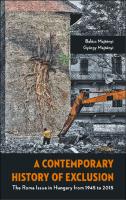A Contemporary History of Exclusion
The Roma Issue in Hungary from 1945 to 2015
Author(s)
Majtényi, György
Majtényi, Balázs
Collection
Knowledge Unlatched (KU)Number
104355Language
EnglishAbstract
This study presents the changing situation of the Roma in the second half of the twentieth century. The authors examine the effects of the policies of the Hungarian state towards minorities by analyzing legal regulations, policy documents, archival sources and sociological surveys. The book offers theoretical background to one of the most burning issues in east Europe.
In the first phase (1945-61), the authors show the efforts of forced assimilation by the communist state. The second phase (1961-89) began with the party resolution denying nationality status to the Roma. The prevailing thought was that Gypsy culture was a culture of poverty that must be eliminated. Forced assimilation through labor activities continued. In the 1970s Roma intellectuals began an emancipatory movement, and its legacy can still be felt. The third phase (1989-2010) brought about some freedoms and rights for the Roma, with large sums spent on various Roma-related programs. Despite these efforts, the situation on the ground did not improve. Segregation and marginalization continues, and is rampant.
Keywords
ethnic relations; minorities; Romanies; social policy; marginalityDOI
10.7829/9789633861462ISBN
9789633861462, 9789633861226Publisher
Central European University PressPublisher website
http://ceupress.com/Publication date and place
2016Grantor
Classification
Nationalism
Ethnic studies


 Download
Download